Why Do Cats Sleep So Much? Cat Sleeping Patterns, Explained!
Is your feline king or queen sleeping all day? Discover how many hours a cat sleeps per day, plus why cats sleep so much in this post.
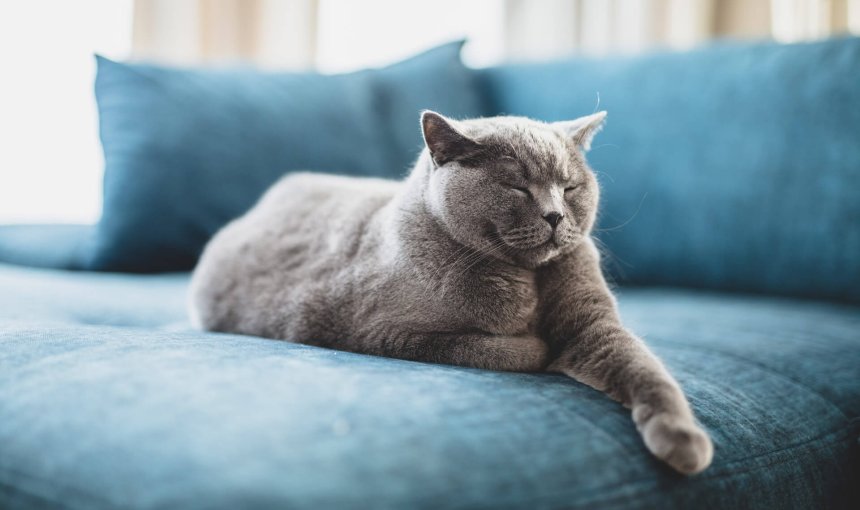
Why do cats sleep so much? Is the amount of time your cat sleeps normal? How much sleep is enough sleep for a cat, anyway? And can too much sleep be a sign of a serious health issue? So many questions! Luckily, we’re here to give you the answers and set your mind at rest when it comes to… well, rest. Find all about cats’ sleeping behaviors and patterns, including how many hours a day cats sleep, how this can change with a cat’s age, and the best way to keep an eye on your cat’s sleep levels.
Why do cats sleep so much?
Just like us, cats need sleep to survive. Regular sleep recharges and restores the body for the next day, and supports memory function as well as the immune system. Different types of sleep including NREM and REM support different functions of the body.
Cats have evolved to sleep for long periods during the day. Doing so allows them to save on energy, which in the wild they would use for hunting, chasing, and finding their next meal. After all, cats are natural hunters (their hunting instinct is one of the main reasons why cats run away).
Just like big cats, your house-lion still keeps to a schedule of hunting, feasting and sleeping1.
Since cats in the wild are typically both predator and prey1, it makes sense that they need a lot of energy to hunt and bring home their next meal, plus stay alert to avoid becoming a snack themselves. Even the most domesticated of cats are still driven by this ancient biological wiring.
Because of this, cats tend to sleep more lightly than humans and take several cat naps throughout the day, rather then one long, deep sleep session at night.
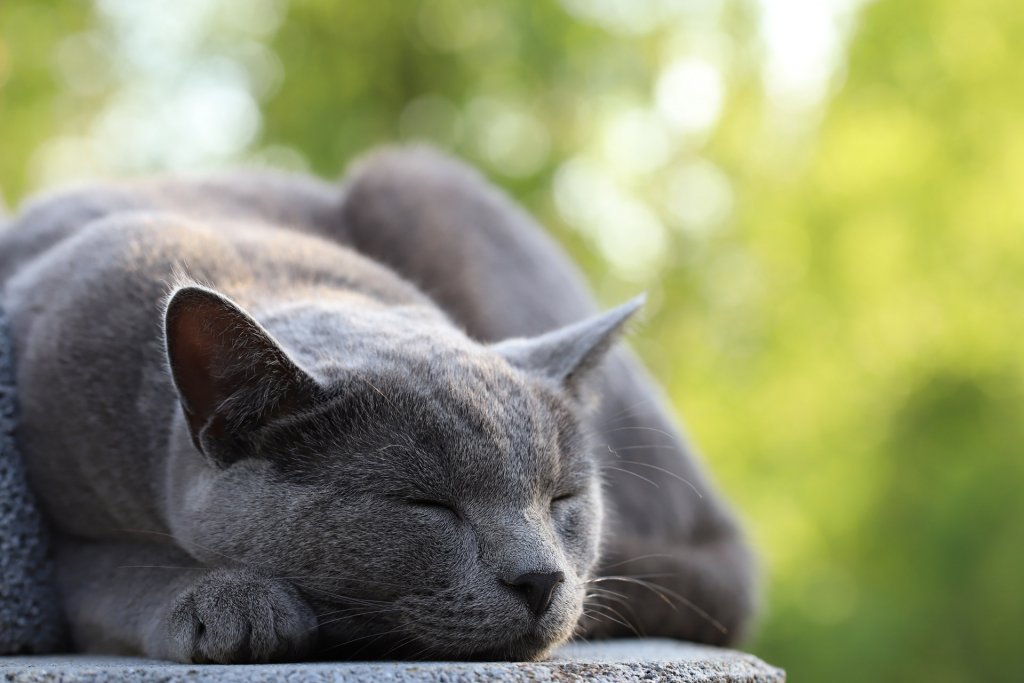
How much do cats sleep?
Cats are sleepy creatures, and chances are, your feline family member is curled up cat-napping right now. It might seem like your furry friend sleeps all day, but how much do cats sleep really?
As for the exact amount of hours a cat sleeps, that depends on factors such as:
- Age: senior cats have less energy and tend to sleep more than younger cats. Kittens, like babies, require lots of sleep to grow.
- Activity level: cats tend to need to sleep more after a high-action day.
- Health condition: if your cat is suffering from a disease, for example cat dementia, their sleeping cycle may be affected.
How many hours a day do cats sleep?
According to veterinary experts, cats normally sleep anywhere from 12 – 20 hours a day2. The average is 15 hours a day, with 40% of all cats sleeping over 18 hours a day. That’s right, your cat sleeps about 2-3 times as long as you. Cats tend to sleep more hours per day as they grow older.
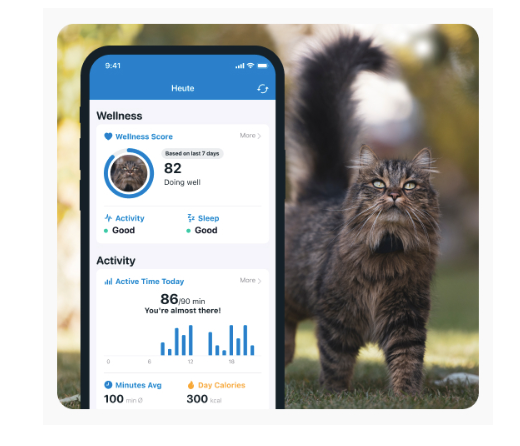
💡 Pro tip: You can find out exactly how many hours a day your cat sleeps (plus see their activity level, live location, and more) with a GPS cat tracker.
For example, Tractive’s Wellness Monitoring provides you a picture of your cat’s sleep patterns – dips, spikes, and more. So you can track how much quality sleep your cat is getting – and how often their sleep gets disturbed. Which can be difficult to keep track of since you obviously can’t watch your cat sleeping all day long.
But with your cat’s sleep data at hand, you can catch health issues early – and get your cat to a vet before their health takes a turn for the worse.
How long do cats sleep?
Our feline friends, unlike us, are polyphasic sleepers. This means that cats sleep several times a day, rather than in one long period. So this explains why your cat probably never sleeps through the night like you do. Instead, your cat naps multiple times throughout the day, usually for period of 50 to 113 minutes, or 78 minutes on average3.
How long do kittens sleep?
Newborn kittens need much more sleep than adult cats. Once they’re born, it’s pretty common for them to spend most of their day sleeping. Your little furballs need all the sleep they can get – or they won’t grow otherwise!
In the first weeks of life, kittens sleep almost continuously. They might wake up occassionally to nurse with Mama Cat. As they get older, they stay awake for longer – but even as they continue to grow, young cats still sleep for a large part of the day. (Often 16 to 20 hours!) But as cats grow older, their daily hours of sleep decrease as well.
Where do cats sleep best?
Cats are pretty picky when it comes to naptime spots. They might prefer a sunny windowsill or a bookshelf – or even your bed. Cats generally feel safer when they have a vantage point to survey their surroundings. Or if they can sleep somewhere peaceful, quiet, and familiar. (Ideally one with your scent – like your bed.)
So if you want to place a basket or a blanket for your cat, go for a quiet corner of your bedroom or living room. Make sure the room is at a comfortable temperature and has a cozy surface. And yes, if you find your cat in bed with you, it’s a sign you’re someone they love and trust. (Just watch out for any tick infections or fleas.)
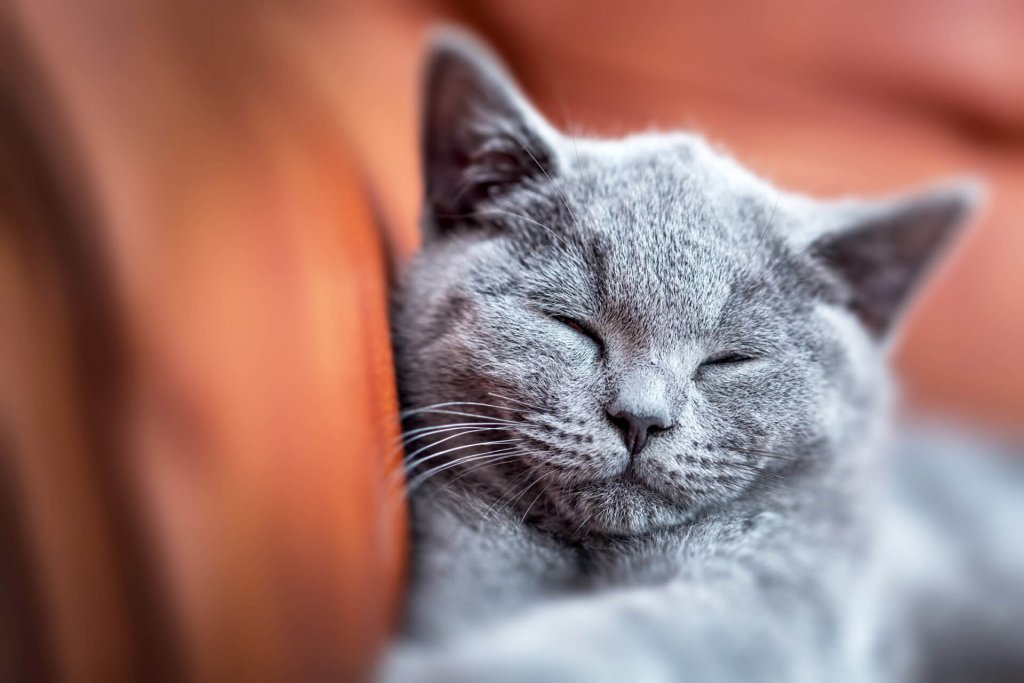
Do cats dream?
You’ll guess it – yes! Just like humans, cats go through different stages of sleep. During the REM (rapid eye movement) phase, cats are in deep sleep and can dream.4
When cats dream, you might observe their muscles twitching – or even hissing or meowing. It’s pretty funny and cute when your cat looks like they’re chasing a mouse while fast asleep. Plus, if your feline friend is able to enter dream-state sleep – it’s a sign they feel safe and secure around you.
So at this point, you might be wondering: what do cats dream about? Well, unfortunately, it’s still a secret. Researchers aren’t 100% sure of what exactly might be going through your cat’s mind while asleep. But just like humans, it’s possible cats are able to process events they’ve just experienced.5 So just like with dogs, who can also experience dream sleep – it’s possible your cat might be dreaming of you too. (And the fun you have together.)
Think your cat might be experiencing a nightmare? It’s best not to wake them up if they’re having a bad dream when they’re in deep sleep.6 This is an important phase of sleep where your cat’s body is healing and repairing itself. So if you wake them up during this phase, you might interrupt the cell renewal process.
Rather, we’d recommend waiting for your cat to wake up by themselves – and give them plenty of hugs and cuddles after. Your presence is comfort enough to overcome any bad dreams.
Are cats nocturnal?
When their cat doesn’t sleep through the night, many cat parents start to wonder if cats are nocturnal. But this is actually a myth; cats are crepuscular, not nocturnal. This means that they’re most active at dawn and dusk.
This behavior is based on their hunting behavior, as cats in the wild tend to prey on animals who are also most active around these times. So if you feel uneasy about your kitty walking around at night, remember that they’re much better equipped for the dark than you are.
If your cat is keeping you awake at night, you can try these tips:
- Don’t reward them by playing, feeding them, or giving them your attention.
- Help them get enough play and exercise before bedtime.
- If you’re not at home during the day, provide stimulation in your absence.
- Keep your cat in another room at night, where they can’t disturb you.
- Avoid punishing your cat for their disruptive behavior.
Your cat’s prey drive is one of the main reasons why cats run away – especially when it’s dark outdoors. But with a dedicated cat tracker like the Tractive GPS, you can track your cat’s movements in real-time every 2-3 seconds. Or set up a “safe zone” which immediately alerts you if your cat steps outside of it. Or track them in the dark with Tractive’s Light and Sound functions, in case they’re in the mood for hide and seek. (And you aren’t.)

Know everywhere your cat goes
See where they are in real-time, no matter how far they go. Get alerts if they roam too far home. Find out where they’ve been and discover their favorite spots. Let others track with you.
Is my cat sleeping too much?
Changes in sleep patterns may be normal, but could also indicate illness in your cat7. If you notice your cat is sleeping more than normal, plus displaying other worrisome behavior such as not eating, this could signal a serious health issue.
Your cat might sleep more than usual if they are suffering from:
- obesity
- kidney disease
- deafness
- hypothyroidism
- nutritional deficiency
- old age
- cat dementia
- feline depression
- infection
- diabetes
- arthritis
- poisoning
For example, one of the first signs a senior cat might be developing cognitive dysfunction syndrome (CDS) is a change in their sleep patterns.8 And since cats are notorious for hiding their sickness, you might miss out on the signs until it’s too late. A sick cat might wander far away from home to manage their sickness by themselves – or just hide from you.
With Tractive’s Wellness Monitoring, you can quickly catch on to a change in your cat’s sleep patterns. So you can detect issues early and keep your cat healthy and happy. Here’s a story from one of our very own pet parents, who caught on to a change in her cat’s regular behaviors – and avoided a medical emergency.
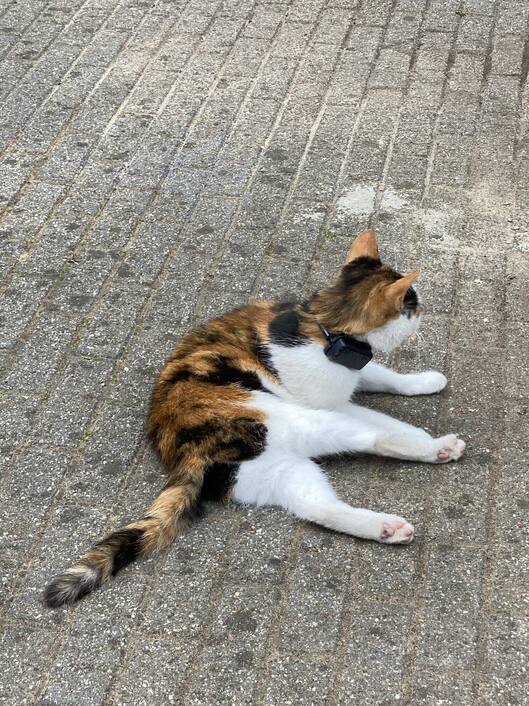
“With the Tractive GPS, I found out one night that she’d only made one little trip to the park, slept all night – and didn’t really do much during the day.
So I decided to check her up to see if she was sick – or had something else going on. When I picked her up, the pus oozed over my hand from the abscess bursting!
Without Tractive, I wouldn’t have noticed it at all. I would still see her walk around to drink and feed and think everything is okay. I might only have noticed when I didn’t see her stroll over for a whole day.
At which point, she’d probably have been dangerously sick.
We went to the vet a few hours later – she had a serious fever, a big abscess, and was pretty sick already. So we got it in time.
A whole week of antibiotics – and now she’s herself again.
Tractive is also very handy for when you need to give your pets their medication. All I have to do is check where she is and call her over to give her the antibiotics.“
– Cissy V, Netherlands
Cat not sleeping enough?
Similarly, if you are concerned that your cat is not sleeping enough, pay attention to your cat’s behavior and contact your vet if necessary. There are some illnesses which might lead to a cat sleeping less than normal, including:
- hyperthyroidism
- hypertension
- feline immunodeficiency virus (FIV)4
Lack of stimulation could be another reason why your cat is missing out on sleep, especially if they’re overactive at night. Providing more activities, play and outdoor exercise can help them improve their sleep.
How much should my cat sleep?
As we mentioned above, it’s typical for cats to need anywhere from 12 to 20 hours of sleep a day. Kittens and senior cats usually require more sleep than healthy adult cats. Talk to your vet to find out how much your cat should sleep, or monitor their daily sleep rhythm in the Tractive GPS app to get an idea of what’s normal for them. Then you can spot if anything about their sleep pattern is off, and identify health issues early on.

“Everything we build puts pets and pet parents first. It’s why we’ve built one device that tracks all aspects of your pet’s safety, from location to wellness. So you can holistically keep them both safe and happy.”
– Sebastian Raab, Product Manager at Tractive & occasional pet sitter
When to talk to your vet
Talk to your vet if your cat sleeps less than 12 hours a day, or more than 20 hour a day, or if their sleeping habits suddenly change. You should also consult a vet if your cat doesn’t wake up easily, or shows any other signs of illness. When it comes to your cat’s health, it’s better to be safe than sorry.


